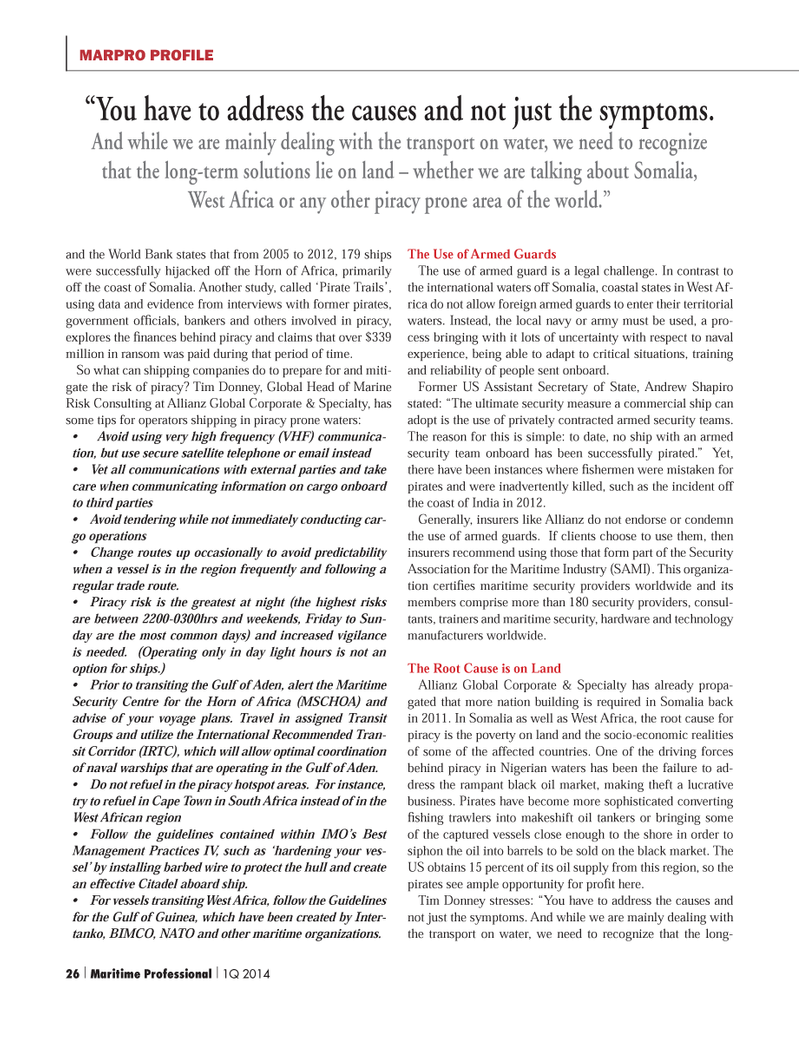
Page 26: of Maritime Logistics Professional Magazine (Q1 2014)
The Energy Edition: Exploration, Production & Transportation
Read this page in Pdf, Flash or Html5 edition of Q1 2014 Maritime Logistics Professional Magazine
and the World Bank states that from 2005 to 2012, 179 ships were successfully hijacked off the Horn of Africa, primarily off the coast of Somalia. Another study, called ‘Pirate Trails’, using data and evidence from interviews with former pirates, government offi cials, bankers and others involved in piracy, explores the fi nances behind piracy and claims that over $339 million in ransom was paid during that period of time.
So what can shipping companies do to prepare for and miti- gate the risk of piracy? Tim Donney, Global Head of Marine
Risk Consulting at Allianz Global Corporate & Specialty, has some tips for operators shipping in piracy prone waters: Avoid using very high frequency (VHF) communica- tion, but use secure satellite telephone or email instead Vet all communications with external parties and take care when communicating information on cargo onboard to third parties Avoid tendering while not immediately conducting car- go operations Change routes up occasionally to avoid predictability when a vessel is in the region frequently and following a regular trade route. Piracy risk is the greatest at night (the highest risks are between 2200-0300hrs and weekends, Friday to Sun- day are the most common days) and increased vigilance is needed. (Operating only in day light hours is not an option for ships.) Prior to transiting the Gulf of Aden, alert the Maritime
Security Centre for the Horn of Africa (MSCHOA) and advise of your voyage plans. Travel in assigned Transit
Groups and utilize the International Recommended Tran- sit Corridor (IRTC), which will allow optimal coordination of naval warships that are operating in the Gulf of Aden. Do not refuel in the piracy hotspot areas. For instance, try to refuel in Cape Town in South Africa instead of in the
West African region Follow the guidelines contained within IMO’s Best
Management Practices IV, such as ‘hardening your ves- sel’ by installing barbed wire to protect the hull and create an effective Citadel aboard ship. For vessels transiting West Africa, follow the Guidelines for the Gulf of Guinea, which have been created by Inter- tanko, BIMCO, NATO and other maritime organizations.
The Use of Armed Guards
The use of armed guard is a legal challenge. In contrast to the international waters off Somalia, coastal states in West Af- rica do not allow foreign armed guards to enter their territorial waters. Instead, the local navy or army must be used, a pro- cess bringing with it lots of uncertainty with respect to naval experience, being able to adapt to critical situations, training and reliability of people sent onboard.
Former US Assistant Secretary of State, Andrew Shapiro stated: “The ultimate security measure a commercial ship can adopt is the use of privately contracted armed security teams.
The reason for this is simple: to date, no ship with an armed security team onboard has been successfully pirated.” Yet, there have been instances where fi shermen were mistaken for pirates and were inadvertently killed, such as the incident off the coast of India in 2012.
Generally, insurers like Allianz do not endorse or condemn the use of armed guards. If clients choose to use them, then insurers recommend using those that form part of the Security
Association for the Maritime Industry (SAMI). This organiza- tion certifi es maritime security providers worldwide and its members comprise more than 180 security providers, consul- tants, trainers and maritime security, hardware and technology manufacturers worldwide.
The Root Cause is on Land
Allianz Global Corporate & Specialty has already propa- gated that more nation building is required in Somalia back in 2011. In Somalia as well as West Africa, the root cause for piracy is the poverty on land and the socio-economic realities of some of the affected countries. One of the driving forces behind piracy in Nigerian waters has been the failure to ad- dress the rampant black oil market, making theft a lucrative business. Pirates have become more sophisticated converting fi shing trawlers into makeshift oil tankers or bringing some of the captured vessels close enough to the shore in order to siphon the oil into barrels to be sold on the black market. The
US obtains 15 percent of its oil supply from this region, so the pirates see ample opportunity for profi t here.
Tim Donney stresses: “You have to address the causes and not just the symptoms. And while we are mainly dealing with the transport on water, we need to recognize that the long-
MARPRO PROFILE VICE ADMIRAL WILLIAM BURKE (RETIRED) “You have to address the causes and not just the symptoms.
And while we are mainly dealing with the transport on water, we need to recognize that the long-term solutions lie on land – whether we are talking about Somalia,
West Africa or any other piracy prone area of the world.” 26 | Maritime Professional | 1Q 2014
MP Q1 2014 18-33.indd 26 2/26/2014 2:00:07 PM

 25
25

 27
27
